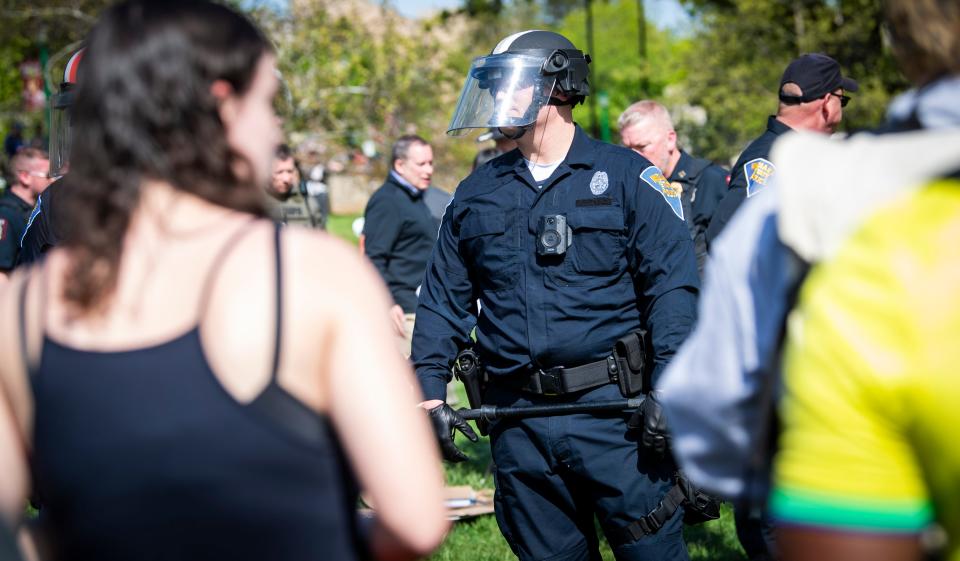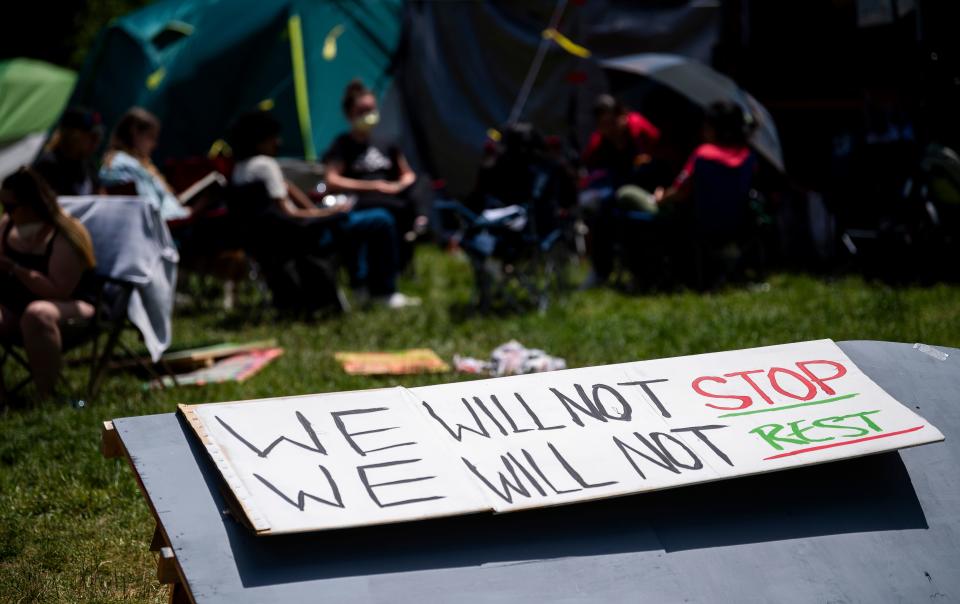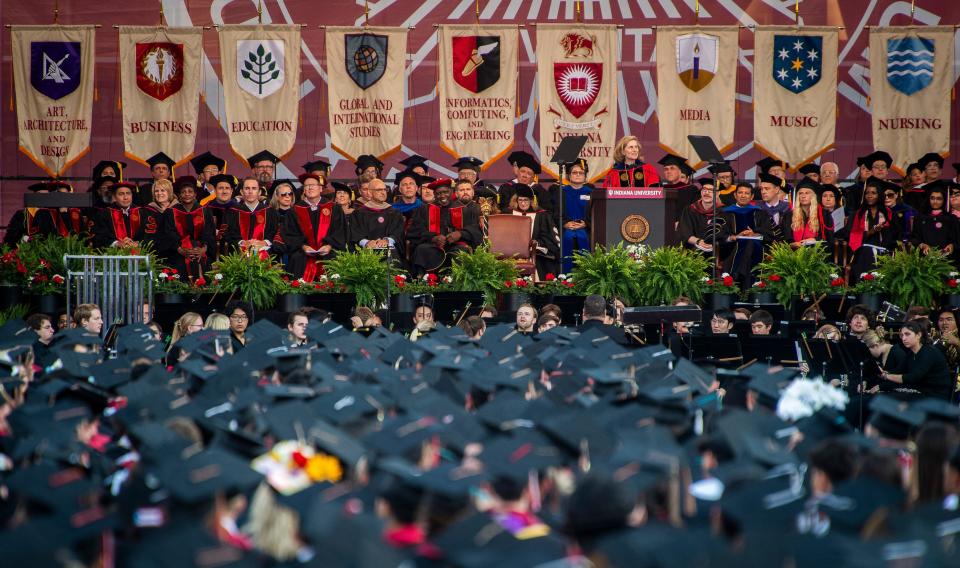Indiana University President Pamela Whitten told faculty she would not resign during two listening sessions with faculty leaders from the College of Arts and Sciences (COAS) last week.
Whitten also defended IU and Indiana State Police’s response to the Dunn Meadow encampments while stating there was no actual threat of violence.
The listening sessions come after months of mounting opposition to Whitten’s administration, manifesting most recently in a vote of no confidence by more than 800 faculty members in April and a growing number of faculty letters and votes calling for Whitten’s termination following IU’s response to protests in Dunn Meadow.

During a college-wide vote on May 1, 86% of COAS faculty voted to call on the IU board of trustees to terminate Whitten’s and IU Provost Rahul Shrivastav’s employment.
The two listening sessions on May 14 and May 15 were closed to the public and consisted mostly of department chairs and notable faculty from the COAS, as well as COAS Dean Rick Van Kooten and IU trustees Donna Spears and Vivian Winston. The sessions were held in the Federal Room of the Indiana Memorial Union.
Trustees agree to ‘independent review’ after disagreements about events in Dunn Meadow
A written summary of the two sessions compiled by Earth and Atmospheric Sciences Chair P. David Polly and incoming English Chair Purnima Bose, who both attended, says approximately 45 minutes of the May 14 session were devoted to discussing the protests in Dunn Meadow.
Whitten was asked if she would lift the trespass bans for those who were arrested in Dunn Meadow and if she would repeal the change to IU’s outdoor policy that was made the day before the encampment. The summary says Whitten “ducked” these and other questions about Dunn Meadow.


Elizabeth Housworth, the chair of the statistics department who attended the May 14 meeting, said Whitten declined to answer the questions because the faculty member who asked the questions admitted they were “somewhat rhetorical.”
“And she picked up on that and said, ‘Well, those are rhetorical, so I’m not going to respond,” Housworth said. “And he asked her to respond, and then she said, ‘Some of those questions were based on fallacies.’”
When asked about the violence and degree of police response to protesters at Dunn Meadow, Whitten said intelligence reports, including “audiotape” and “pictures of pepper spray and creek rocks” suggested to her that the campus community was at a risk of violence. Whitten said later in the session that there was “no actual threat of violence”. Whitten said she also understood that police had attempted to de-escalate but were “rebuffed” by protestors.
“It was clear that President Whitten’s understanding of the demonstrations at Dunn Meadow differs dramatically from the experiences of faculty and students who were present on the scene,” the summary reads.
At the end of the May 14 session, a faculty member asked the trustees in attendance to conduct an independent investigation of the events at Dunn Meadow, “given the wildly divergent stories the President presented in contrast to the experiences of people on the ground, including several in the meeting,” according to the report. On May 15, the Board of Trustees released a statement announcing an “independent review into the campus climate,” citing the “issues” and “challenges” on campus, though no specifics were mentioned.
IU spokesperson Mark Bode said in a statement that, “President Whitten and her team will work with members of the Board of Trustees to collaboratively select an independent entity to review campus climate.”
Faculty bring up laundry list of concerns, question Whitten’s leadership
Following May 14’s lengthy discussion about Dunn Meadow, COAS faculty agreed before the May 15 listening session to only discuss other issues at the second session.


Topics from the May 15 session included the administration’s handling of the Kinsey Institute, the cancellation of Samia Halaby’s exhibition, the lack of due process in the suspension of professor Abdulkader Sinno and feelings that Whitten had failed to defend faculty or IU with the passing of Senate Bill 202 in the state Legislature and Jim Banks’ recent letter in the Indy Star characterizing protesting faculty as “pro-Hamas” and “loitering” in the “illegal encampment.”
“There’s just a lot that people are upset about,” Housworth said. “There’s just so much going wrong, and there’s enough people who are upset, that they’re all pulling in the same direction, which is absolutely opposite President Whitten.”
Cynthia Graham, a professor of gender studies and a senior scientist at the Kinsey Institute who attended the May 15 session, said Whitten frequently described the topics brought up as “eye-opening,” and asked faculty to be “patient” as she listened to their concerns.
“As someone who sat through that for almost two hours, I was just absolutely shocked at how little she answered,” Graham said. “I think the best thing that we felt was that the board of trustees members were there, and they were taking notes.”
Attendees at both the May 14 and 15 sessions asked Whitten to clarify questions about her vision for IU. Housworth and Graham both said Whitten repeatedly said she had “big ideas,” but didn’t provide specifics.
“Whitten was asked for her vision three times during the meeting in three different ways – her philosophy for decision making, her vision for what IU looks like in two to three years, what goals she wants to accomplish – and each time she said she needed more time to develop major points, to come up with big ideas, and that she needs our patience,” the summary reads.
According to Graham and the written summary, Whitten encouraged faculty to contribute ideas to her and said, “Let’s pitch spaghetti at the wall together.” Housworth said she and several faculty members at the meeting were confused by this comment.
“It’s two years into your term; we shouldn’t be ‘throwing spaghetti at the wall,’” Housworth said.
Prior to the COAS listening sessions, Whitten met with faculty from the O’Neill School of Public and Environmental Affairs. Whitten had planned meetings with faculty from the Kelley School of Business and School of Education on May 16, but these were postponed after she had to move up the date for an eye surgery procedure. The Kelley School listening session will be rescheduled to late summer or early fall.
Graham said while she’s optimistic about the independent review that was announced, she and faculty she’s spoken to who attended the meeting were largely disappointed in Whitten’s responses throughout the two listening sessions.
“Nothing she said was at all reassuring,” Graham said. “We’ve gotten to the point where listening sessions aren’t going to do anything, and we need some answers.”
Reach Brian Rosenzweig at [email protected]. Follow him on Twitter/X at @brianwritesnews.
This article originally appeared on The Herald-Times: Pamela Whitten tells Indiana University faculty she won’t resign
Source Agencies

